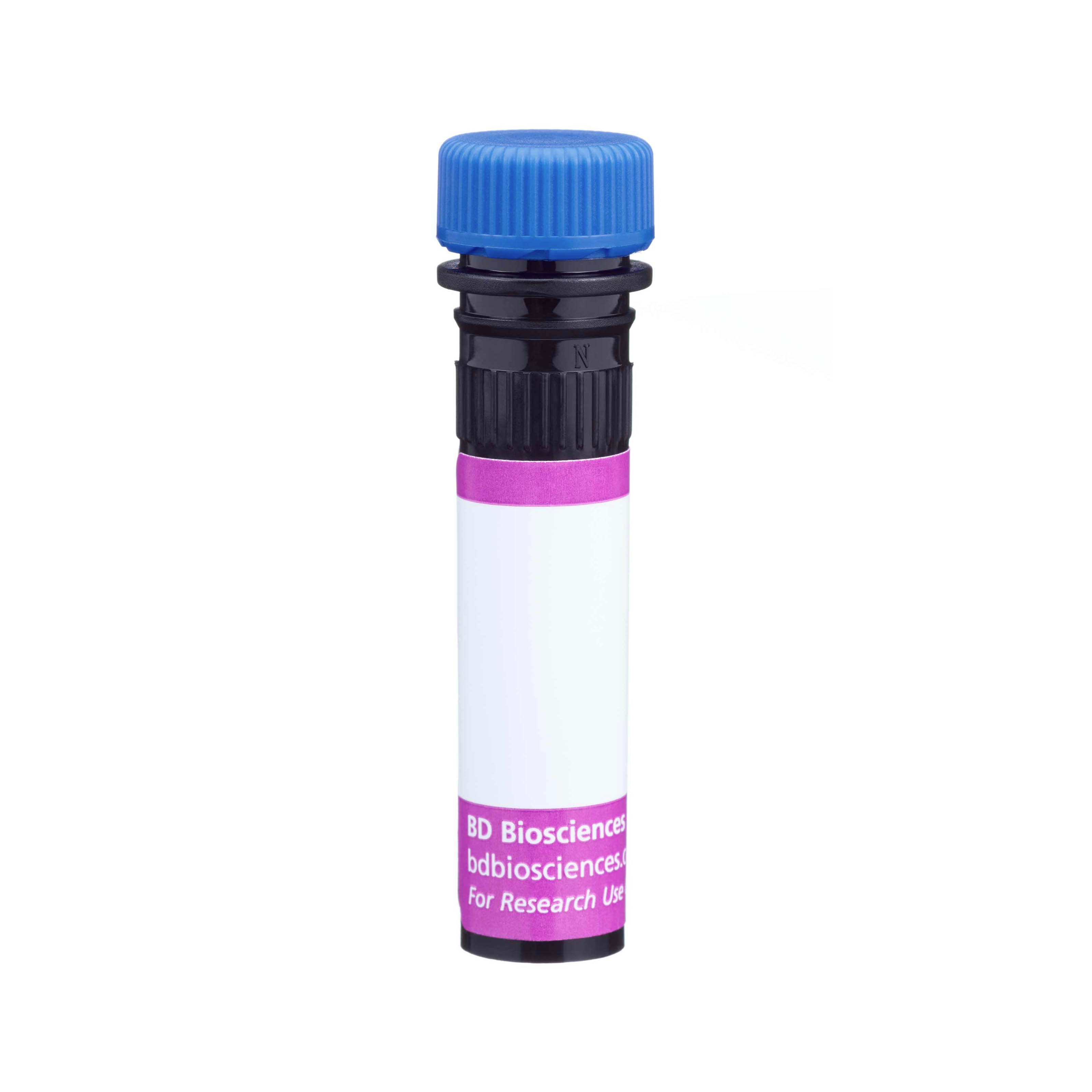Old Browser
This page has been recently translated and is available in French now.
Looks like you're visiting us from {countryName}.
Would you like to stay on the current country site or be switched to your country?




Flow cytometric analysis of CD11c expression on C57BL/6 mouse splenic leucocyte subsets. Panel 1. Splenic Leucocytes. Mouse splenic leucocytes were preincubated with Purified Rat Anti-Mouse CD16/CD32 antibody (Mouse BD Fc Block™) (Cat. No. 553141/553142). The cells were then stained with Alexa Fluor® 647 Rat Anti-Mouse I-A/I-E (Cat. No. 562367) and either BD Horizon™ BV421 Hamster IgG2, λ Isotype Control (Cat. No. 562629; Left Plot) or BD Horizon BV421 Armenian Hamster Anti-Mouse CD11c antibody (Cat. No. 565451/565452; Right Plot). Two-color flow cytometric contour plots showing the correlated expression of I-A/I-E versus CD11c (or Ig Isotype control staining) were derived from gated events with the forward and side light- scatter characteristics of viable leucocytes. Panel 2. Ly6G/Ly6C-negative Splenic Leucocytes. Mouse splenic leucocytes were similarly preincubated with Mouse BD Fc Block™ and stained with APC Rat Anti-Mouse CD45R/B220 (Cat. No. 553092/561880) and PerCP-Cy™5.5 Rat Anti-Mouse Ly6G/Ly6C (Cat. No. 552093) antibodies and either BD Horizon BV421 Hamster IgG2, λ Isotype Control (Left Plot) or BD Horizon BV421 Armenian Hamster Anti-Mouse CD11c antibody (Right Plot). Two-color flow cytometric contour plots showing the correlated expression of CD45R/B220 versus CD11c (or Ig Isotype control staining) were derived from Ly6G/Ly6C- events with the forward and side light- scatter characteristics of viable leucocytes. Flow cytometric analysis was performed using a BD LSRFortessa™ Flow Cytometer system.


BD Horizon™ BV421 Armenian Hamster Anti-Mouse CD11c

Regulatory Status Legend
Any use of products other than the permitted use without the express written authorization of Becton, Dickinson and Company is strictly prohibited.
Preparation And Storage
Recommended Assay Procedures
For optimal and reproducible results, BD Horizon Brilliant™ Stain Buffer should be used anytime BD Horizon Brilliant™ dyes are used in a multicolor flow cytometry panel. Fluorescent dye interactions may cause staining artifacts which may affect data interpretation. The BD Horizon Brilliant Stain Buffer was designed to minimize these interactions. When BD Horizon Brilliant Stain Buffer is used in in the multicolor panel, it should also be used in the corresponding compensation controls for all dyes to achieve the most accurate compensation. For the most accurate compensation, compensation controls created with either cells or beads should be exposed to BD Horizon Brilliant Stain Buffer for the same length of time as the corresponding multicolor panel. More information can be found in the Technical Data Sheet of the BD Horizon Brilliant Stain Buffer (Cat. No. 563794/566349) or the BD Horizon Brilliant Stain Buffer Plus (Cat. No. 566385).
Product Notices
- Since applications vary, each investigator should titrate the reagent to obtain optimal results.
- An isotype control should be used at the same concentration as the antibody of interest.
- Source of all serum proteins is from USDA inspected abattoirs located in the United States.
- Caution: Sodium azide yields highly toxic hydrazoic acid under acidic conditions. Dilute azide compounds in running water before discarding to avoid accumulation of potentially explosive deposits in plumbing.
- For fluorochrome spectra and suitable instrument settings, please refer to our Multicolor Flow Cytometry web page at www.bdbiosciences.com/colors.
- Pacific Blue™ is a trademark of Molecular Probes, Inc., Eugene, OR.
- Alexa Fluor® is a registered trademark of Molecular Probes, Inc., Eugene, OR.
- Cy is a trademark of GE Healthcare.
- BD Horizon Brilliant Stain Buffer is covered by one or more of the following US patents: 8,110,673; 8,158,444; 8,575,303; 8,354,239.
- BD Horizon Brilliant Violet 421 is covered by one or more of the following US patents: 8,158,444; 8,362,193; 8,575,303; 8,354,239.
- Although hamster immunoglobulin isotypes have not been well defined, BD Biosciences Pharmingen has grouped Armenian and Syrian hamster IgG monoclonal antibodies according to their reactivity with a panel of mouse anti-hamster IgG mAbs. A table of the hamster IgG groups, Reactivity of Mouse Anti-Hamster Ig mAbs, may be viewed at http://www.bdbiosciences.com/documents/hamster_chart_11x17.pdf.
- Please refer to www.bdbiosciences.com/us/s/resources for technical protocols.
Companion Products






The N418 monoclonal antibody specifically binds to CD11c, the Integrin alpha X (Integrin αX, Itgax) chain of the heterodimeric gp150, 95 (CD11c/CD18, αXβ2) integrin that forms the complement receptor 4 (CR4). CD11c is a150 kDa type I transmembrane glycoprotein that is expressed on dendritic cells, CD4-CD8+ intestinal intraepithelial lymphocytes (IEL), and some NK cells and T cells. CD11c expression is upregulated on IEL and T cells following activation. Cells of the monocyte/macrophage lineage have been reported to express low levels of CD11c. The CD11c/CD18 integrin can bind to several ligands including iC3b, fibrinogen, and CD54. This integrin reportedly plays important roles in phagocytosis and in mediating cellular interactions during inflammation.

Development References (3)
-
Crowley MT, Inaba K, Witmer-Pack MD, Gezelter S, Steinman RM. Use of the fluorescence activated cell sorter to enrich dendritic cells from mouse spleen. J Immunol Methods. 1990; 133(1):55-66. (Clone-specific: Flow cytometry, Fluorescence activated cell sorting). View Reference
-
Metlay JP, Witmer-Pack MD, Agger R, Crowley MT, Lawless D, Steinman RM. The distinct leukocyte integrins of mouse spleen dendritic cells as identified with new hamster monoclonal antibodies. J Exp Med. 1990; 171(5):1753-1771. (Immunogen: Flow cytometry, Immunohistochemistry, Immunoprecipitation). View Reference
-
Sadhu C, Ting HJ, Lipsky B, et al. CD11c/CD18: novel ligands and a role in delayed-type hypersensitivity. J Leukoc Biol. 2007; 81(6):1395-1403. (Clone-specific: Blocking). View Reference
Please refer to Support Documents for Quality Certificates
Global - Refer to manufacturer's instructions for use and related User Manuals and Technical data sheets before using this products as described
Comparisons, where applicable, are made against older BD Technology, manual methods or are general performance claims. Comparisons are not made against non-BD technologies, unless otherwise noted.
For Research Use Only. Not for use in diagnostic or therapeutic procedures.
Report a Site Issue
This form is intended to help us improve our website experience. For other support, please visit our Contact Us page.